|
|
|
Sort Order |
|
|
|
Items / Page
|
|
|
|
|
|
|
| Srl | Item |
| 1 |
ID:
125075
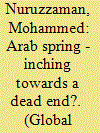

|
|
|
|
|
| Publication |
2013.
|
| Summary/Abstract |
A high degree of pessimism continues to hold a strong grip over the enthusiasts of democracy in the Arab world. In the last more than two years, the popular uprisings for social and political change have stalled in Bahrain, Syria, and Yemen. In Egypt, Libya, and Tunisia, where the populace succeeded in toppling the authoritarian rulers, the situation did not change that much. Violence, conflicts, and killings of political opponents disturbingly characterize all the Arab countries affected by the popular uprisings. In Syria, the government and opposition forces are locked in a deadly conflict with neither side being able to make a decisive breakthrough. The Egyptian army overthrew the country's first democratically elected government, headed by the Muslim Brotherhood, on 3 July 2013. On the whole, the success rate of democratization is so far disappointing. That begs the question whether the Arab popular uprisings for democratic change, what the media has conveniently dubbed the 'Arab Spring', are failing or still enduring.
|
|
|
|
|
|
|
|
|
|
|
|
|
|
|
|
| 2 |
ID:
125031
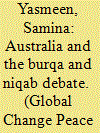

|
|
|
|
|
| Publication |
2013.
|
| Summary/Abstract |
This paper locates the discussion on wearing niqab and burqa within the context of information acquisition and response formation among Muslims and non-Muslims in the contemporary world. The paper argues that, against the backdrop of varied opinions on Islam and Muslims around the world, the debate on wearing burqa represents the continuation - albeit up-scaling - of the focus on Muslim women as the signifiers of Islam and Muslim identities. Australia is influenced by, and dealing with, the debate on whether or not to ban the burqa and niqab. Opinions among both the wider community and Muslims have differed on the justification and advisability of such a ban. The Australian government at the federal and state levels has demonstrated cautious activism in dealing with the issue, thus protecting the rights of Australian Muslim minorities, and reducing the space in which a heightened sense of exclusion could develop among them.
|
|
|
|
|
|
|
|
|
|
|
|
|
|
|
|
| 3 |
ID:
125040


|
|
|
|
|
| Publication |
2013.
|
| Summary/Abstract |
Despite its relative absence from much of the literature on politics in the Pacific region, religiosity is an assumed and often unchallenged component of political life. Drawing from more than 100 in-depth biographical interviews with politicians, around 40 published life histories and other publicly available material, this article uses Pierre Bourdieu's concept of 'habitus' to explore how politicians see the role of faith and religious association contributing to their public profile, election campaigning, representative and legislative functions, and 'inner' life. It advances two arguments: firstly, that ideal analytic distinctions like state, society and religion become problematic in the Pacific Islands where political leaders tend to occupy multiple roles and assume overlapping identities; and, secondly, that despite the overwhelming religiosity seemingly apparent in public rhetoric, secularization is an effervescent narrative across the region with politicians vocal protagonists on all sides of this debate.
|
|
|
|
|
|
|
|
|
|
|
|
|
|
|
|
| 4 |
ID:
125076
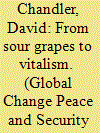

|
|
|
|
|
| Publication |
2013.
|
| Summary/Abstract |
He does not spend too much time on drawing the links with Operaismo/Workerism as a post- 1956 reaction against the Italian Communist Party (PCI), especially in the theoretical and political work around the time of Quaderni Rossi ('Red Notebooks', 1961-65), Classe Operaia ('Working Class', 1963-66) and the organization Potere Operaio, or the generalization of anti-party calls for self-activity beyond the mass factory to the 'social factory' in the Italian autonomist movements of the 1970s. Some background would have allowed readers to appreciate how the shift from workerism in the 1960s to the autonomia/autonomist movement of the late 1970s, enabled the Italian Left to give 1968 student lifestyle radicalism a Marxist makeover: rather than an individualist, student-centred understanding of the world, workers in everyday life and struggle made the world and provided the life-giving creative vital forces which capitalism sought to be both parasitical upon and to artificially contain. Here sociology was the key discipline of critique: blurring the political/economic divide of Stalinist determinism and rejecting the party's possession of 'objective' understandings of economic bases, structures and contradictions.
|
|
|
|
|
|
|
|
|
|
|
|
|
|
|
|
| 5 |
ID:
125025
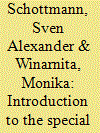

|
|
|
|
|
| Publication |
2013.
|
| Summary/Abstract |
The second half of the twentieth century witnessed the rise of what might arguably be described as political religion, with faith traditions everywhere experiencing parallels to the rise of Hindutva in India or the 'muscular' and virulently anti-minority political Buddhism of Sri Lanka and Myanmar. Similarly, Israel, a country founded by cosmopolitan, social-democratic nineteenth century perceptions of Jewish 'national' identity, is increasingly struggling with its ostensibly secular founding ethos. Religiously conservative political parties and attitudes have become mainstreamed in Israel's political landscape in the last couple of decades.1 What might help account for these seemingly similar developments, all of which appear to contradict the basic dictum of secularization theory, namely that increasingly prosperous, urban and industrialized societies will relegate religion and religious practices to the private sphere of a personal 'faith'? Until recently, the assumption persisted that the historical experience of Western Europe, the first part of the world to undergo industrialization and the wider sociocultural effects associated with the process of 'secularization', would be replicated as other parts of the world modernized. An important debate has ensued over the past 20 years or so, involving scholars representing a wide range of disciplinary backgrounds over what appears to be the revitalization of religion and even possibly processes of de-secularization.
|
|
|
|
|
|
|
|
|
|
|
|
|
|
|
|
| 6 |
ID:
125055


|
|
|
|
|
| Publication |
2013.
|
| Summary/Abstract |
In this communications piece I want to try and capture some learnings from many years' work in this area of religious harmony. As a Church leader, I have generally had very demanding responsibilities; looking after large areas and numbers of people through our parishes, schools and welfare agencies. Accordingly, I am more a reflective activist than a scholar or academic. At the same time, I am convinced that the success of bringing religions into dialogue depends critically on broadening the base of those involved in these efforts. My commitment to the need for better religious harmony came when I was a University Chaplain at Monash University, Melbourne in the 1980s. Through the inspiration of the university's founders and various benefactors there was an Interreligious Centre, incorporating separate prayer rooms and chapels for different religions. There were sufficient 'religious' wars going on overseas then for us to appreciate how blessed we were to go to and from our Religious Centre in an uncomplicated way. On a Friday, I would be celebrating Holy Communion whilst Muslims were preparing for Friday prayers, Jews for the Sabbath. Incense from the Buddhist prayers would be in the air, along with our frankincense in the thurible. We would reflect that, in many parts of the world, such religious harmony would only invite a 'bomb'.
|
|
|
|
|
|
|
|
|
|
|
|
|
|
|
|
| 7 |
ID:
125047
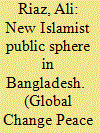

|
|
|
|
|
| Publication |
2013.
|
| Summary/Abstract |
Historically, Bangladesh has a strong and culturally embedded vibrant public sphere. The Bangladeshi public sphere always consists of a multiplicity of publics. The idea of public sphere in Bangladesh was based on the idea of secular rationality or religious neutrality. However, the situation is changing; attempts are being made to create an Islamist public sphere. This paper highlights two examples of this effort to foster the Islamization of the public sphere: production of Islamist fiction and founding women's discussion groups. It argues that the emerging Islamist public sphere in Bangladesh only subscribes to one interpretation of Islam and that the traditional authorities are now being replaced by the Islamist interpretation advanced by ideologues. It further argues that the absence of reference to local syncretistic traditions in the new Islamist discourse makes its authenticity suspect.
|
|
|
|
|
|
|
|
|
|
|
|
|
|
|
|
| 8 |
ID:
125072
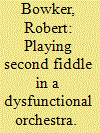

|
|
|
|
|
| Publication |
2013.
|
| Summary/Abstract |
The failure of Australian Prime Minister Menzies' mission to Egypt in 1956 and the expulsion of the Australian diplomatic mission from Cairo dominate thinking about Australian Middle East diplomacy during the 1950s. Archival records, particularly in regard to the issue of the Suez Canal base negotiations concluding in 1954 show a predisposition, with occasional racist undertones, on the part of the Menzies government to line up with its British counterpart. Despite changing regional realities, and notwithstanding efforts by Australian officials in Cairo and Canberra to inject greater realism and caution into Australia's stance, Casey gave departmental officials little support. The article underlines the importance in Australian foreign policy of according appropriate weighting to fraternal and alliance-focussed concerns, but also to having the skills and experience required to evaluate the degree to which Australian interests may be affected by events on the ground and the policy choices of our partners.
|
|
|
|
|
|
|
|
|
|
|
|
|
|
|
|
| 9 |
ID:
125037
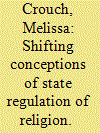

|
|
|
|
|
| Publication |
2013.
|
| Summary/Abstract |
This article seeks to understand how and why states regulate the activities or affairs of religious communities. It does so through a case study of the Indonesian Draft Law on Inter-religious Harmony. The article draws out three general considerations to the study of the dynamics of state regulation of religious affairs: situating modern state approaches to the regulation of religion in historical context; recognizing the framework within which state and religion is structured; and acknowledging the influence of legal norms other than state law. The Indonesian Draft Law on Inter-religious Harmony addresses key debates between Muslims and Christians and within Islam, and it draws upon existing policies of the Ministry of Religion and also of the fatwa of the Indonesian Ulama Council. The shift in state attempts to regulate religion is therefore related to the dynamic and contested nature of the relationship between the branches of government and religious authorities in democratic Indonesia
|
|
|
|
|
|
|
|
|
|
|
|
|
|
|
|
| 10 |
ID:
125063
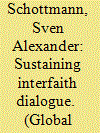

|
|
|
|
|
| Publication |
2013.
|
| Summary/Abstract |
Present-day Australia is often described as a successful example of a modern multicultural state. A growing number of non-British and non-European migrants have helped transform the country into an increasingly plural society. Intolerance and even outright racism persist in a few sectors, but on the whole, Australia's political, cultural and intellectual elites have accepted the need for migration, even if they have not always rushed to embrace the concept of multiculturalism. The most cursory of surveys of Australian cities, suburbs and even rural areas would readily reveal the extent to which the country has changed from the days of the 'white Australia' policy. Ethnic and cultural pluralism are just two measures of this new social pluralism; the growing diversity of religious expression is another very important dimension of Australia's multicultural reality. As Michális S. Michael points out, a key 'antidote to the politics of fear' has been the range of interfaith and multi-faith councils and networks that were set up in the course of the last 10 years. Some of these efforts were, in part at least, driven by what Joseph Camilleri describes as a 'narrow understanding of social cohesion' undertaken 'in the hope that dialogue would more effectively integrate [Muslims] into the mainstream'.3 They reflect still common views of Muslims as a 'problematic' minority prone to radicalization and the tendency to self-segregate. Nonetheless, these efforts of facilitating engagement across religious lines are a belated recognition of the social, economic and political significance of Australia's religious diversity, indeed of the enduring role religion plays in the modern, secular world.
|
|
|
|
|
|
|
|
|
|
|
|
|
|
|
|
| 11 |
ID:
125073
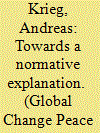

|
|
|
|
|
| Publication |
2013.
|
| Summary/Abstract |
The heavy direct or indirect reliance of liberal states on the military and security services of the private contractor in contemporary warfare is an undeniable reality. While the literature presents a wide array of different empirical explanations of why liberal states have come to increasingly rely on contractor support, this paper attempts to give a normative explanation to this development. This paper does not aim to refute the existing explanations but merely complement the most commonly stated reasons for outsourcing. It argues that the liberal state's hiring of private contractors can be understood against the backdrop of a wider trend whereby liberal states, increasingly operating in non-trinitarian operations, attempt to replace the soldier as a trinitarian servant with non-trinitarian means of warfare. This correlation between liberal state commitments in non-trinitarian warfare and a growing employment of non-trinitarian means of warfare can be explained by Social Contract theory and lays the foundation for a normative understanding of why liberal states resort to non-trinitarian contractor support amid non-trinitarian crises.
|
|
|
|
|
|
|
|
|
|
|
|
|
|
|
|
|
|
|
|
|